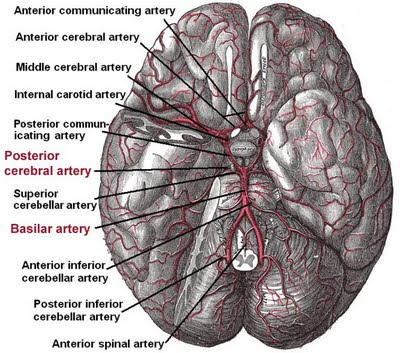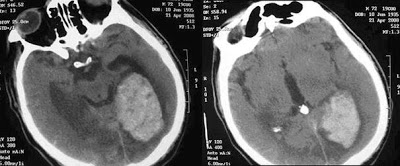Neuroscience
At least it sounds pretty horrible...
Dide-Botcazo Syndrome, or "top of the basilar" syndrome, is a rare clinical condition caused by bilateral occlusion of the posterior cerebral arteries (labelled below in red).

The arteries of the base of the brain.
A case report by Cappellari et al., 2009 describes a 72 year old man who had a major stroke affecting the territories of both posterior cerebral arteries, resulting in damage to L and R occipital cortex, R thalamus, and R medial temporal lobe (see below).
 Fig. 2 (Cappellari et al., 2009). MRI-DWI [diffusion weighted imaging] demonstrates areas of altered signal in bilateral occipital regions, right thalamus and right mesial temporal lobe [MTL, critical for memory], suggesting an ischemic origin [caused by decreased blood supply]. NOTE: R side of brain on L side of scan.
Fig. 2 (Cappellari et al., 2009). MRI-DWI [diffusion weighted imaging] demonstrates areas of altered signal in bilateral occipital regions, right thalamus and right mesial temporal lobe [MTL, critical for memory], suggesting an ischemic origin [caused by decreased blood supply]. NOTE: R side of brain on L side of scan.
Shortly thereafter, some of the ischemic areas started hemorrhaging (huge white areas in the CT scan below).
 Fig. 3 (Cappellari et al., 2009). Brain CT demonstrates a hemorrhagic transformation of the left temporal and occipital ischemic lesions.
Fig. 3 (Cappellari et al., 2009). Brain CT demonstrates a hemorrhagic transformation of the left temporal and occipital ischemic lesions.
The resulting behavioral syndrome consisted of cortical blindness from the extensive damage to visual cortex, with anosognosia (denial or unawareness) for blindness, amnesia (from MTL damage), and topographical disorientation thrown in for good measure:
Reference
Cappellari, M., Tomelleri, G., Matteo, A., Carletti, M., Magalini, A., Bovi, P., & Moretto, G. (2009). Dide-Botcazo syndrome due to bilateral occlusion of posterior cerebral artery Neurological Sciences DOI: 10.1007/s10072-009-0179-7
- It Wasn't Me, It Was Someone Else: Agency Error And Alien Hand
A sense of agency is the feeling that you're initiating and controlling your own movements. This can go awry in schizophrenia, when individuals can experience delusions of control (Lafargue & Franck, 2009). In this state, the patient feels as...
- Picasso Or Prosopometamorphopsia?
Olga Khokhlova, as painted by her husband, Pablo Picasso The Left Side of Your Face Looks Distorted! The rare syndrome of unilateral left prosopometamorphopsia -- in which the left half of well-known and unfamiliar faces looks distorted -- was reported...
- Neuropsychology Abstract Of The Day: The Wernicke Conundrum And Primary Progressive Aphasia
M-Marsel Mesulam, Cynthia K. Thompson, Sandra Weintraub, and Emily J. Rogalski (2015). The Wernicke conundrum and the anatomy of language comprehension in primary progressive aphasia. Brain. [Published online June 25 2015 doi:10.1093/brain/awv154] Wernicke’s...
- Neuropsychology Abstract Of The Day: Fmri Study Of Digit Symbol Task
Usui N, Haji T, Maruyama M, Katsuyama N, Uchida S, Hozawa A, Omori K, Tsuji I, Kawashima R, & Taira M. (2009). Cortical areas related to performance of WAIS Digit Symbol Test: a functional imaging study. Neurosci Lett. Jul 21. Many neuropsychological...
- Dreaming
Several news organizations are publishing reports about a forthcoming paper in the Annals of Neurology concerning a case study about the loss of dreaming as a consequence of a stroke. One of the authors of the report, Dr. Claudio L. Bassetti, is quoted...
Neuroscience
The Horror of Dide-Botcazo Syndrome
At least it sounds pretty horrible...
Dide-Botcazo Syndrome, or "top of the basilar" syndrome, is a rare clinical condition caused by bilateral occlusion of the posterior cerebral arteries (labelled below in red).

The arteries of the base of the brain.
A case report by Cappellari et al., 2009 describes a 72 year old man who had a major stroke affecting the territories of both posterior cerebral arteries, resulting in damage to L and R occipital cortex, R thalamus, and R medial temporal lobe (see below).
 Fig. 2 (Cappellari et al., 2009). MRI-DWI [diffusion weighted imaging] demonstrates areas of altered signal in bilateral occipital regions, right thalamus and right mesial temporal lobe [MTL, critical for memory], suggesting an ischemic origin [caused by decreased blood supply]. NOTE: R side of brain on L side of scan.
Fig. 2 (Cappellari et al., 2009). MRI-DWI [diffusion weighted imaging] demonstrates areas of altered signal in bilateral occipital regions, right thalamus and right mesial temporal lobe [MTL, critical for memory], suggesting an ischemic origin [caused by decreased blood supply]. NOTE: R side of brain on L side of scan.Shortly thereafter, some of the ischemic areas started hemorrhaging (huge white areas in the CT scan below).
 Fig. 3 (Cappellari et al., 2009). Brain CT demonstrates a hemorrhagic transformation of the left temporal and occipital ischemic lesions.
Fig. 3 (Cappellari et al., 2009). Brain CT demonstrates a hemorrhagic transformation of the left temporal and occipital ischemic lesions.The resulting behavioral syndrome consisted of cortical blindness from the extensive damage to visual cortex, with anosognosia (denial or unawareness) for blindness, amnesia (from MTL damage), and topographical disorientation thrown in for good measure:
Stable neurological picture, several days after onset, was characterized by persistent cortical blindness with absence of awareness of blindness, confabulation and spatial disorientation, recent memory disturbance, apathy, inertia and left hemiparesis [weakness].Along with all the other sensory and cognitive deficits, it seems like the co-occurrence of apathy and inertia was a good thing...
Reference
Cappellari, M., Tomelleri, G., Matteo, A., Carletti, M., Magalini, A., Bovi, P., & Moretto, G. (2009). Dide-Botcazo syndrome due to bilateral occlusion of posterior cerebral artery Neurological Sciences DOI: 10.1007/s10072-009-0179-7
- It Wasn't Me, It Was Someone Else: Agency Error And Alien Hand
A sense of agency is the feeling that you're initiating and controlling your own movements. This can go awry in schizophrenia, when individuals can experience delusions of control (Lafargue & Franck, 2009). In this state, the patient feels as...
- Picasso Or Prosopometamorphopsia?
Olga Khokhlova, as painted by her husband, Pablo Picasso The Left Side of Your Face Looks Distorted! The rare syndrome of unilateral left prosopometamorphopsia -- in which the left half of well-known and unfamiliar faces looks distorted -- was reported...
- Neuropsychology Abstract Of The Day: The Wernicke Conundrum And Primary Progressive Aphasia
M-Marsel Mesulam, Cynthia K. Thompson, Sandra Weintraub, and Emily J. Rogalski (2015). The Wernicke conundrum and the anatomy of language comprehension in primary progressive aphasia. Brain. [Published online June 25 2015 doi:10.1093/brain/awv154] Wernicke’s...
- Neuropsychology Abstract Of The Day: Fmri Study Of Digit Symbol Task
Usui N, Haji T, Maruyama M, Katsuyama N, Uchida S, Hozawa A, Omori K, Tsuji I, Kawashima R, & Taira M. (2009). Cortical areas related to performance of WAIS Digit Symbol Test: a functional imaging study. Neurosci Lett. Jul 21. Many neuropsychological...
- Dreaming
Several news organizations are publishing reports about a forthcoming paper in the Annals of Neurology concerning a case study about the loss of dreaming as a consequence of a stroke. One of the authors of the report, Dr. Claudio L. Bassetti, is quoted...
